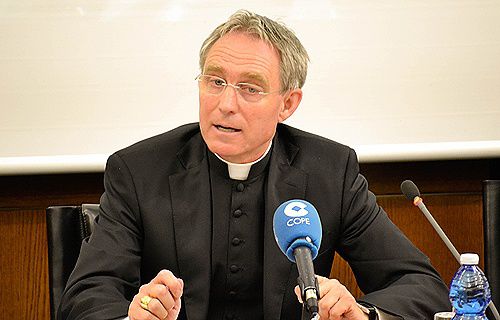In a recent interview with CNA, the prefect of the Papal Household and personal secretary to Benedict XVI recounted how the current and emeritus Bishops of Rome are connected by their diplomacy during apostolic journeys. Archbishop Georg Gaenswein was at the June 5 conference “The Pope's journeys: between diplomacy and communication,” held at the Pontifical University of the Holy Cross, and noted what is common to Benedict XVI and Pope Francis, even though their diplomacy has been interpreted according to their differing characters. The conference was an occasion for presenting “Sull'aereo di Papa Benedetto,” a recent work by Italian journalist Angela Ambrogetti, which gathers Benedict's press conferences on the papal plane during his pontificate. “When the Pope makes an apostolic journey, it is clear that diplomacy plays a key role, with regards to both words and gestures,” Archbishop Gaenswein said, calling diplomacy a “thread” in Benedict XVI's pontificate. He stressed the importance of the five so-called ‘political speeches’ Benedict XVI held during his apostolic journeys, in front of the representatives of the world of culture and politics. He added that through these speeches, one can better understand the Bavarian's diplomatic sense — even if the sense of his words was rarely understood. “In the beginning, it was always surprising to me how different were the newspaper reports about the same speeches,” Archbishop Gaenswein underscored. While Benedict XVI was subjected “to several prejudices directed against him as the former prefect of the Congregation for the Doctrine of the Faith,” he noted, Pope Francis “gained the trust of journalists” from the time he first spoke on the loggia of St. Peter's. “I myself must take into account that Benedict has been considered ‘the Pope of the word,’ while Pope Francis is considered ‘the Pope of gestures,’” Archbishop Gaenswein added. “Pope Francis has made very eloquent and surprising gestures." The latest of these was his call to Palestinian president Mahmoud Abbas and Israeli president Shimon Peres for a prayer for peace in the Holy Land held in the Vatican Gardens. “Pope Francis invited the two leaders to the Vatican, to his home, to pray for peace, and this explains the inner meaning of his call: prayer is stronger than diplomacy,” Archbishop Gaenswein said. “As Pope Francis has explained, his gestures are not planned; he is struck by the Spirit. This is his character, and I see this every day, working with him, accompanying him, listening to him, speaking with him.” This is “Pope Francis’ 'forma mentis,' or 'way of thinking,' since gestures are very significant for him, and this distinguishes him from Benedict XVI, being a man of thought. In fact, even if Benedict XVI often spoke off the cuff, he was always prepared: this is his own 'forma mentis.'”

